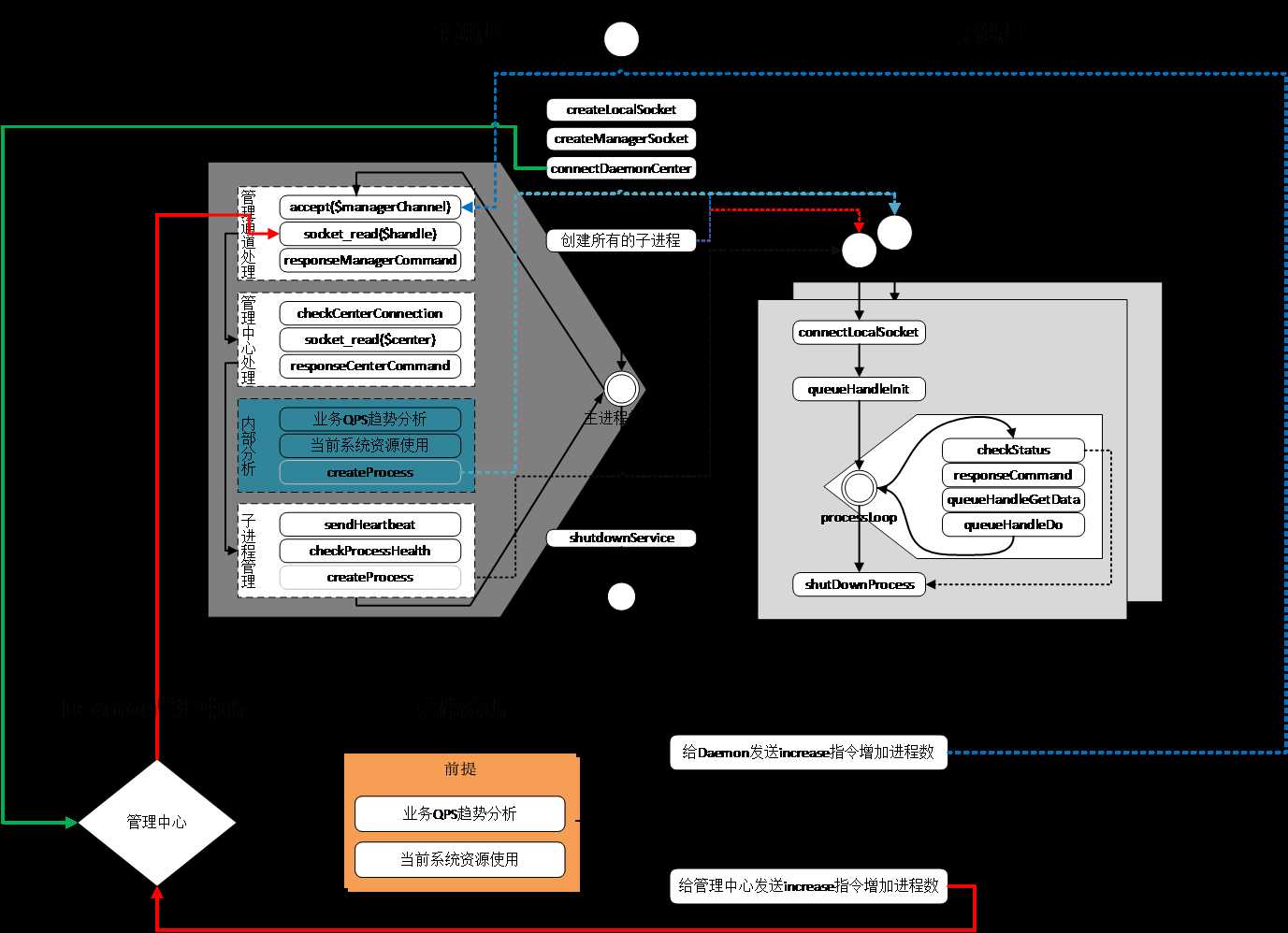标签:
这个框架主要是开多个子进程来异步处理任务,同时主进程能和子进程通信,了解子进程的status,并且能restart子进程。
管理者可以了解主进程的信息info,并且能shutdown主进程。管理者和主进程之间通过tcp通信。
这个过程涉及主进程Master,子进程Worker,队列Queue,以及消费者Consumer。
这几天学习框架,一方面要学会如何组装零件,也要回拆解零件,更加要学会改进零件。
问问自己
(1) 框架的数据流是否梳理清楚
(2) 能否改进框架
(3) 如果框架有bug,能否将其修复
(4) 这个框架有什么优缺点,为什么要如此设计
(5) 如果重写这个框架,你是否能重写好这个框架。
有些事情,出现得刚刚好。
刚好最近在研究框架之类的东西,先看了一个MVC框架类的简单东西。很久没有刷微博,偶尔刷微博的时候,突然发现了一个项目框架作者分享的daemon处理框架,跟项目的框架非常类似,但是更加简洁。

于是屁颠屁颠将代码git clone下来,并且在机器上部署了ubantu的虚拟机。
--运行daemon程序
--从queue中pop出data,然后输出这个data
---使用phpredis的扩展
---在Redis中写队列的相关扩展
---使用mysqlDB,能够访问db的资源
---为一个工程配置各种资源
---想想如何将工程逻辑单独提取出来,再单独建立一个App的文件夹,然后在App中写好run的相关逻辑,在配置指定好run函数所在脚本。
---主进程和子进程如何通信的,子进程如何循环重启的?---代码中有自动重启的部分,如果运行超过一定时间,子进程会给主进程发送restart的命令,主进程会将子进程的worker从workerclients中去除。主进程在轮询的时候,遍历workerclients,发现worker不存在了,会重新再创建。
---管理进程与主进程保持通信,直接redis-cli –h 127.0.0.1 –p 9008就可以看主进程的运行状态。
1. 感性认识
配置运行环境
安装xmapp
安装redis
配置phpredis
运行代码
https://github.com/pythias/Stark
php src/Stark/run.php -f [ini_config_file]
第一步自己写了一个测试,将数据打印出来,之后逐步修改代码,queue->pop出数据,consumer->run处理数据。
在run.php中get_options返回queue的相关参数,这样可以创建队列实例,并且实现pop函数。这样可以通过queue->pop()从队列中获取到相关数据,并且采用实例化的consumer对象调用run函数来处理data。
<?php
... function get_options($file) { .... ‘queue‘ => array( ‘class‘ => ‘\\Stark\\Daemon\\Queue\\RedisQueue‘, ‘options‘ => array( ‘host‘ => get_option_value($config, ‘queue.host‘, ‘127.0.0.1‘), ‘port‘ => get_option_value($config, ‘queue.port‘, 6379), ‘queueKey‘ => get_option_value($config, ‘queue.queueKey‘, ""), ), ), .... }
RedisQueue其实是使用redis来作为队列,进行数据的pop。
<?php namespace Stark\Daemon\Queue; class RedisQueue extends Base { protected $_serverConfigs = false; protected $_queueKey = false; protected $_host = false; protected $_port = false; private $_redis = null; public function init(\Stark\Daemon\Worker $worker) { //连接服务器 $this->_redis = new \Redis(); $this->_redis->connect($this->_host, $this->_port); $this->_redis->rpush($this->_queueKey, "you are a beautiful girl!"); } public function pop(\Stark\Daemon\Worker $worker) { $data = $this->_redis->lpop($this->_queueKey); return $data; } public function push(\Stark\Daemon\Worker $worker, $data) { echo "push data - {$this->_queueKey} - {$data}\r\n"; return $this->_redis->rpush($this->_queueKey, $data); } public function complete(\Stark\Daemon\Worker $worker) { //关闭链接 $this->_redis->close(); } }
2. 入口文件run.php
$options = get_options($config_file);
$daemon = new \Stark\Daemon\Master($options);
$daemon->start();
(1)getOptions解析配置文件,获取Consumer,Queue,Master的参数。
配置文件config.ini如下
[main] name = "config" host = "127.0.0.1" port = 9008 working_dir = "/tmp" [run] script_file = "run.php" memory_limit = "1024M" [worker] count = 4 max_run_count = 10000 max_run_seconds = 3600 max_idle_seconds = 60 [queue] host = "127.0.0.1" port = "6380" queueKey = "test:redis"
解析出来的参数如下:
Options = array( ‘consumer‘ => array( ‘class‘ => ‘\\Stark\\Daemon\\Consumer\\Callback‘, ‘options‘ => array( ‘init‘ => ‘init‘, ‘run‘ => ‘run‘, ‘complete‘ => ‘complete‘, ), ), ‘queue‘ => array( ‘class‘ => ‘\\Stark\\Daemon\\Queue\\RedisQueue‘, ‘options‘ => array( ‘host‘ => get_option_value($config, ‘queue.host‘, ‘127.0.0.1‘), ‘port‘ => get_option_value($config, ‘queue.port‘, 6379), ‘queueKey‘ => get_option_value($config, ‘queue.queueKey‘, ""), ), ), ‘master‘ => array( ‘name‘ => get_option_value($config, ‘main.name‘, ‘Stark_‘ . time()), ‘host‘ => get_option_value($config, ‘main.host‘, ‘127.0.0.1‘), ‘port‘ => get_option_value($config, ‘main.port‘, 9003), ‘maxWorkerCount‘ => get_option_value($config, ‘worker.count‘, 1), ‘maxRunCount‘ => get_option_value($config, ‘worker.max_run_count‘, 10000), ‘maxRunSeconds‘ => get_option_value($config, ‘worker.max_run_seconds‘, 3600), ‘maxIdleSeconds‘ => get_option_value($config, ‘worker.max_idle_seconds‘, 60), ‘memoryLimit‘ => get_option_value($config, ‘run.memory_limit‘, ‘1024M‘), ), );
(2)创建Master实例,并根据返回options创建consumer,worker,queue实例,并且初始化master的相应选项。
Master继承Options类,所以创建Master实例的时候,会执行Options的构造函数。
<?php namespace Stark\Core; class Options { public function __construct($options = array()) { $this->setOptions($options); } protected function setOptions($options) { if (is_array($options) == false && empty($options)) { return; } foreach ($options as $key => $value) { $methodName = ‘_set‘ . ucfirst($key) . ‘Options‘; if (method_exists($this, $methodName)) { if (call_user_func_array(array($this, $methodName), array($value)) == false) { throw new \Stark\Daemon\Exception\Options("Set option failed, option:{$key}"); } else { continue; } } $property = "_{$key}"; if (isset($this->$property) == false) throw new \Stark\Daemon\Exception\Options("Set option failed, option:{$key}"); $this->$property = $value; //TODO:value type } return true; } } ?>
Options相当于一个基类。可以用来创建类实例,同时初始化实例成员。依据上面options数组的KEY(master,consumer,queue等),如果存在_set[KEY]Options 这个函数,就执行该函数,如果成员变量存在相应的key,就初始化该成员。
protected function _setMasterOptions($options) { return $this->setOptions($options); } protected function _setQueueOptions($options) { return $this->_setClassOptionsByType($options, ‘Queue‘); } protected function _setConsumerOptions($options) { return $this->_setClassOptionsByType($options, ‘Consumer‘); } private function _setClassOptionsByType($options, $type) { if (empty($options[‘class‘])) { return false; } $className = $options[‘class‘]; if ($className[0] != ‘\\‘) { $className = "\\Stark\\Daemon\\{$type}\\{$className}"; } if (class_exists($className) == false) { return false; } $property = ‘_‘ . lcfirst($type); $this->$property = new $className(isset($options[‘options‘]) ? $options[‘options‘] : array()); return true; }
上述的代码的功能主要是创建Master的_consumer(Consumer类型),_queue(Queue类型)实例,然后初始化Master的name,host,port以及maxWorkerCount,maxRunCount,maxRunSeconds,maxIdelSeconds,memoryLimit成员变量。
(3)启动主进程
主进程启动函数,主要负责检查运行环境(php版本)是否满足要求checkEnvironments;并初始化工程目录initialize;判断daemon程序是否一直在运行(若在运行,则终止);在后台运行主进程runInBackground,并且设置其跑满所有的核setAffinity;然后是创建主进程和子进程的本地通信socket连接(createDaemonSocket),管理进程和主进程的网络通信socket连接(createAdminSocket)。之后创建多个workers,并且启动多个worker。
startLoop轮询去检查多个worker的状态,接受管理进程的请求(info,shutdown),接受子进程的请求(restart,status)。
以下是Master::start的函数:
public function start() { ini_set(‘memory_limit‘, $this->_memoryLimit); $this->_checkEnviroments(); $this->_initialize(); $this->_daemonIsRunning(); \Stark\Core\System::runInBackground(); $this->_pid = posix_getpid(); $this->_createPidFile(); \Stark\Core\System::setAffinity($this->_pid); \Stark\Core\System::setProcTitle($this->_pid, "daemon ‘{$this->_name}‘"); //sample worker $this->_createSampleWorker(); //start daemon $this->_startTime = microtime(true); $this->_setupSignal(); $this->_createDaemonSocket(); $this->_createAdminSocket(); $this->_startWorkers(); $this->_startLoop(); }
创建多个wokers子进程,并且启动各个子进程,各个子进程进行相应的初始化,各项轮询,最后进行关闭整个daemon。至于子进程是如何启动的,后续再进行讲述。
private function _createWorker($index) { echo "Start worker {$index}\r\n"; $currentMicroTime = microtime(true); if (isset($this->workerStatuses[$index]) == false) { $this->workerStatuses[$index] = new \Stark\Daemon\Status(); } if (($currentMicroTime - $this->workerStatuses[$index]->startTime) < self::WORKER_START_INTERVAL_SECONDES) { $this->_log->log("Worker {$index} cannt start right now", \Stark\Core\Log\Level::ERROR); return false; } $this->workerStatuses[$index]->startTime = $currentMicroTime; $this->workerStatuses[$index]->lastActiveTime = $currentMicroTime; $forkPid = pcntl_fork(); if ($forkPid == -1) { $this->_exit("Unable to fork worker {$index}"); } if ($forkPid) { $this->workerStatuses[$index]->pid = $forkPid; } else { socket_close($this->_daemonSocket); socket_close($this->_adminSocket); $pid = posix_getpid(); \Stark\Core\System::setAffinity($pid, ‘2-32‘); \Stark\Core\System::setProcTitle($pid, "daemon ‘{$this->_name}‘ worker {$index}"); $this->workerStatuses[$index]->totalCpuU += $this->workerStatuses[$index]->cpuU; $this->workerStatuses[$index]->totalCpuS += $this->workerStatuses[$index]->cpuS; $this->_worker->pid = $pid; $this->_worker->index = $index; $this->_worker->start(); } }
Master是主进程,Worker是子进程,Master和Worker之间是主进程和子进程间的本地通信,而Admin和Master之间是两台机器之间的网络TCP通信。
这个是管理进程和主进程进行通信。
private function _startLoop() { $this->_log->log("Starting daemon: {$this->_name}", \Stark\Core\Log\Level::INFO); $time = microtime(true); $lastWorkerTime = $time; $lastAdminTime = $time; while (true) { $now = microtime(true); if (($now - $lastAdminTime) > self::ADMIN_DATA_INTERVAL_SECONDES) { $this->_acceptConnection($this->_adminSocket, $this->_adminClients); $this->_checkAdminCommands(); $lastAdminTime = $now; } $this->_acceptConnection($this->_daemonSocket, $this->_workerClients); if (($now - $lastWorkerTime) > $this->_heartbeat) { $this->_sendHeartbeatToWorkers(); $missingWorkerList = $this->_checkWorkerStatus(); if (empty($missingWorkerList) === false) { foreach ($missingWorkerList as $index) { $this->_createWorker($index); } } $lastWorkerTime = $now; } usleep(1000); } }
主进程和子进程如何通信的,子进程如何循环重启的?
private function _acceptConnection($socket, &$clients) { $newClient = @socket_accept($socket); if ($newClient) { socket_set_nonblock($newClient); socket_getsockname($newClient, $ip, $port); $clients[] = array( ‘client‘ => $newClient, ‘ip‘ => $ip, ‘port‘ => $port, ‘index‘ => -1, ); } }
private function _checkAdminCommands() { $offlineClients = array(); foreach ($this->_adminClients as $key => $clientInfo) { $client = $clientInfo[‘client‘]; $responseValue = Protocol::read($client); // 从客户端client读取到命令 if (empty($responseValue)) { if (is_resource($client)) { $errorCode = socket_last_error($client); if ($errorCode != SOCKET_EAGAIN) { $offlineClients[] = $key; } } else { $offlineClients[] = $key; } } else { $this->_responseCommand($client, $responseValue, self::COMMAND_FROM_ADMIN); // 解析管理进程发出的命令 } } foreach ($offlineClients as $key) { if (is_resource($this->_adminClients[$key])) { socket_close($this->_adminClients[$key]); } unset($this->_adminClients[$key]); } return true; }
info命令,应该是主进程从管理进程所在客户端读取,然后解析info命令,第一个参数为command,后续参数为命令参数,,调用infoAdminHandler进行相应处理。
shutdown命令类似。
// 给子进程发送心跳,检查其状态,如果无法获取到子进程的状态,说明该子进程已经死掉,所以要从workerClients列表中清除它。
private function _sendHeartbeatToWorkers() { foreach ($this->_workerClients as $key => $clientInfo) { $client = $clientInfo[‘client‘]; if ($this->_sendCommandToWorker($client, ‘status‘) === false) { unset($this->_workerClients[$key]); continue; } } } private function _sendCommandToWorker($client, $command, $arguments = array()) { $write = Protocol::write($client, $command, $arguments); // 往子进程写命令请求 if ($write === false) return false; $responseValue = Protocol::read($client, false); // 读取子进程返回的结果 if (empty($responseValue) === false) { $this->_responseCommand($client, $responseValue, self::COMMAND_FROM_WORKER); // 解析子进程的返回的结果 } return true; }
主进程往子进程写status命令请求,子进程读取status命令,并将处理结果返回给主进程,即主进程从子进程客户端读取status命令的处理结果。
status是子进程处理命令请求,返回结果。但是这个status命令请求是主进程发出来的。
后续的restart命令是子进程传给主进程,主进程处理restart命令请求,将该子进程杀掉,之后在检查该子进程不存在的时候,重新创建。
(4)启动子进程,并且轮询消耗队列,进行相关处理,同时
public function start() { $this->_initialize(); $this->_startLoop(); $this->_finalize(); exit; }
Worker的循环,不断的消耗队列。DoQueue由消费者去消耗queue->pop出的data。ReceiveCommands连接主进程,接收主进程的命令,并返回相应的结果。
private function _startLoop() { while ($this->_run) { $this->_queueStartTime = microtime(true); $this->_checkStatus(); // 检查相关的状态 $this->_receiveCommands(); // 接收主进程的相关命令(比如status命令) if ($this->_pause) { usleep(1000); continue; } if ($this->_doQueue() === false) { usleep(1000); } } }
该框架的难点在于:进程间通信(包括主进程和子进程之间的通信,也包括管理进程和主进程之间的TCP通信)
打日志----标记时间,文件名,类名,函数名,功能,来处理相关函数。
还非常需要流程图!!!!

标签:
原文地址:http://www.cnblogs.com/TsingLo/p/4678565.html